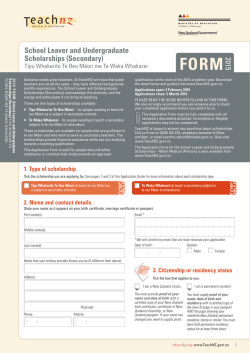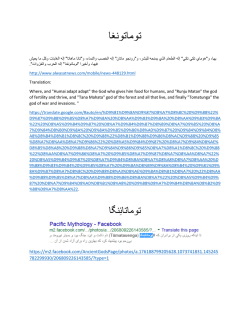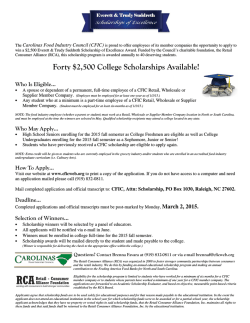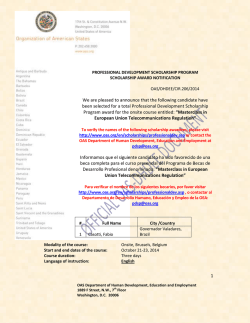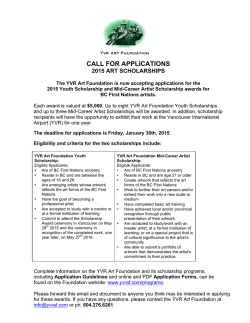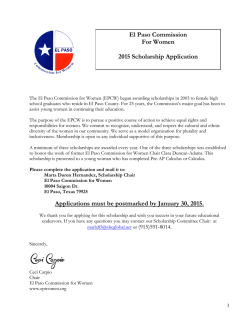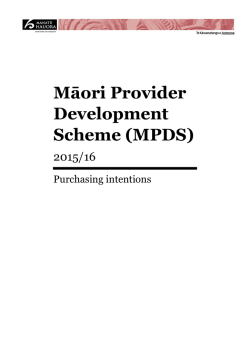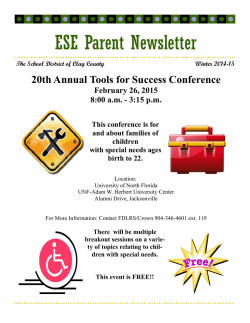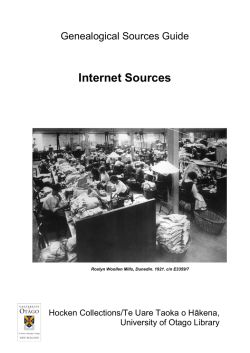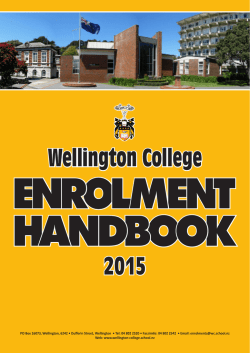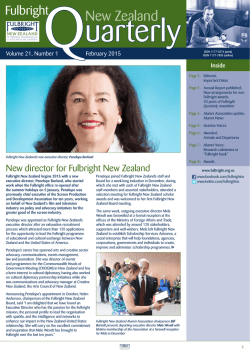
2015 APP GUIDE TchNZ SL Undergrad (SEC
School Leaver and Undergraduate Scholarships (Secondary) 2015 GUIDE Tipu Whakarito Te Reo Māori me Te Waka Whakarei T E REO M ĀORI ME T E WA K A W H A K A REI 2 0 1 5 G U I D E School Leaver and Undergraduate Scholarships (Secondary) T IPU W H A K A RI T O Important Please read this Guide before filling in the Application Form. It contains important information to help you: »» decide whether or not to apply for a scholarship »» select the scholarship type relevant to you »» fill out the Application Form. The Application Form must be fully completed with all necessary documents attached. Incomplete or illegible applications may not be considered. We strongly recommend you ask someone else to check your completed application before you send it to us. The Application Form is valid only for people commencing or continuing study at the start of the 2015 academic year. Download the latest forms and guides from www.TeachNZ.govt.nz. The application process Applications open: 2 February 2015 Applications close: 2 March 2015 TeachNZ is happy to answer any questions about scholarships. Call us (free) on 0800 165 225, weekdays between 8:30am and 5pm, or email [email protected]. Also visit www.TeachNZ.govt.nz. COLOUR KEY: This Guide and Application Form are colour coded. Areas with a white background apply to everyone making an application and the coloured sections match the scholarship type you are applying for: All applicants Tipu Whakarito Te Reo Māori Te Waka Whakarei Scholarship information What are the scholarships worth? Apply to enrol in an approved qualification. See information on page 2 of this Guide. A School Leaver and Undergraduate Scholarship (Secondary) pays your compulsory course fees (up to four full-time years). Full-time students may also receive an allowance. The allowance is $10,000 over the period of study (up to four full-time years). Receive an offer of a place to study from your tertiary provider. How many scholarships are available? Gather the appropriate documents to include with your application. See pages 2–4 and the checklist on page 6 for more information. Scholarship eligibility Scholarship numbers are capped. For 2015 there are 30 School Leaver and Undergraduate Scholarships (Secondary) Tipu Whakarito Te Reo Māori me Te Waka Whakarei available. You must meet the eligibility criteria to be assessed for a scholarship. Get all of your photocopied documents certified. Take the copies and originals to be sighted, and please ensure the front page of every copy is stamped and endorsed as a true copy of the original. Post or courier your completed Application Form and attached documents on or before 2 March 2015. Postal and courier addresses are on page 8 of the Form. We will let you know by email that we have received your application. Please contact us if your application is not acknowledged within one week of the closing date, or if your contact details change. Note: You can only be awarded one TeachNZ scholarship. If you have previously received a TeachNZ scholarship, and failed to meet the terms and conditions of that scholarship, you are not eligible to reapply. There are two types of scholarship available: Tipu Whakarito Te Reo Māori – for people wanting to teach te reo Māori as a subject in secondary schools. Tipu Whakarito Te Reo Māori means the beginning of new shoots of te reo Māori. Te Waka Whakarei – for people wanting to teach a secondary subject in te reo Māori in wharekura. Te Waka Whakarei – He waka taua whai tauihu, whai whakanikoniko, whakahirahira. This means a canoe of importance, decorated and embellished. The eligibility criteria for each scholarship type are listed on page 2. 0800 165 225 www.TeachNZ.govt.nz 1 Eligibility criteria Tipu Whakarito Te Reo Māori scholarship – to become a teacher of te reo Māori in secondary schools. To be eligible you must: »» be a New Zealand citizen or permanent resident »» be proficient in te reo Māori to a level that meets the requirements of the tertiary provider »» be enrolled in a degree that enables you to study at least one 300-level paper in Māori studies, development, language, culture or society, followed by a Graduate Diploma of Secondary Teaching or be enrolled in an approved secondary conjoint degree »» have leadership experience »» have support from your iwi and/or Māori leaders in your community. Te Waka Whakarei scholarship – to become a teacher of a secondary subject in te reo Māori in Wharekura. To be eligible you must: »» be a New Zealand citizen or permanent resident »» be proficient in te reo Māori to a level that meets the requirements of the tertiary provider »» be enrolled in a degree that enables you to study at least one 300-level paper in a specialist secondary subject, for teaching to a senior level, followed by a Graduate Diploma of Secondary Teaching or be enrolled in an approved secondary conjoint degree »» have leadership experience »» have support from your iwi and/or Māori leaders in your community. How are the scholarship applications assessed? When applications are received by TeachNZ they will be checked to ensure they meet all eligibility criteria. TeachNZ will assess your application using information supplied by both you and your tertiary provider. Part of the enrolment process for your teaching qualification may include a language proficiency assessment. Your tertiary provider will share the result of this assessment with TeachNZ to assist in the consideration of your application. Approved secondary teaching education qualifications These are listed on this page. For more information about the qualifications, see the TeachNZ Secondary Teacher Education Qualifications guide on the TeachNZ website, www.TeachNZ.govt.nz/getqualified. Please contact the tertiary provider directly to confirm details of any programme you are interested in. AUT University School of Education Te Kura Mātauranga AK3515 Graduate Diploma in Secondary Teaching Bethlehem Tertiary Institute PC1796 Graduate Diploma of Teaching (Secondary) Massey University College of Education MY6009 Graduate Diploma of Teaching (Secondary) New Zealand Graduate School of Education PCCC01 Graduate Diploma in Teaching (Secondary) The University of Auckland Faculty of Education AC1062 Bachelor of Physical Education (Secondary) AU4090 Graduate Diploma in Teaching (Secondary) The University of Waikato Faculty of Education WI0001 Bachelor of Education (Technology) WI0125, WI0126, WI0127, WI0128, WI0129 Bachelor of Teaching – conjoint degrees years 1–8, 7–10 and 11–13 WI0199 Graduate Diploma of Teaching (Secondary) WIO199, WI0823 Graduate Diploma of Teaching (Secondary) and Graduate Diploma in Engineering (Technology Teaching) or Graduate Diploma in Tourism and Hospitality Management (Teaching) University of Canterbury College of Education CN0901 Bachelor of Education (Physical Education) with Honours CECC01 Graduate Diploma in Teaching and Learning – Secondary University of Otago College of Education OO0458 Graduate Diploma in Teaching – Secondary Education Victoria University of Wellington Faculty of Education VI00L8 / VI00MI Bachelor of Arts/Bachelor of Teaching (BA/BTeach) / Bachelor of Science/Bachelor of Teaching (BSc/BTeach) VIOOP3 Graduate Diploma of Teaching (Secondary) Completing the Application Form 1. Type of scholarship On the Application Form, tick the scholarship type you are applying for, then follow the colour-coded instructions. A selection panel made up of experts who are fluent in te reo Māori will then assess your application on the following: »» your oral and written proficiency in te reo Māori »» your qualifications and leadership experience »» support of your application by your iwi and/or Māori leaders in your community. 2. Name and contact details Proof of your name and date of birth Please supply a certified copy of one of the following: »» passport »» birth certificate »» certificate of citizenship. Please ensure you enter on the Application Form the name that your tertiary provider knows you by. Proof of your name change (if applicable) Please supply a certified copy of one of the following: »» marriage certificate »» deed poll document »» birth certificate (that shows name change). 0800 165 225 www.TeachNZ.govt.nz 2 3. Citizenship or residency status Proof of your citizenship or residency status If you are a New Zealand citizen you need to provide a certified copy of: »» your New Zealand passport (ID page) OR »» your New Zealand birth certificate OR »» your certificate of New Zealand citizenship. If you are a permanent resident you need to provide certified copies of the following pages in your passport: »» the main ID page AND »» the page showing your indefinite New Zealand permanent residency stamp or sticker. You must have held permanent residency status for at least three years. 4. Ethnicity Please state your ethnicities (you may list up to three). If you are Māori, please specify your iwi (you may list up to three different iwi). This information may be used for statistical purposes. 5. Qualifications and academic history TeachNZ considers the qualifications you already hold when assessing your application. »» Insert details of the highest qualification you’ve achieved or partially completed, either academic or work-related. »» If you are currently studying towards your highest qualification, enter that qualification on the Application Form. »» Attach certified evidence of your achievement or partial completion of this qualification to the Application Form. »» You can provide further support for your application by inserting details of any other qualifications, certificates and awards that you may have achieved. Attach certified evidence of these as well. What do I need to provide if I have already commenced study towards my teaching qualification? What if my academic transcript shows that I have failed some papers? You may provide reasons for this if you wish. What should I do if I have overseas qualifications? You must get them assessed by the New Zealand Qualifications Authority (NZQA) before sending us your application. This includes Australian qualifications. You can apply to get your overseas qualifications assessed at www.nzqa.govt.nz or by contacting NZQA on 0800 697 296. All papers must be translated into English. NZQA will take several weeks to assess these. What are equivalent qualifications? Equivalent qualifications are ones that are considered the same level on the New Zealand Qualifications Framework. For example, New Zealand’s National Certificate of Educational Achievement (NCEA) Level 2 is equivalent to Sixth Form Certificate. What should I do if I have lost proof of my qualifications? You will need to contact NZQA or your tertiary provider to request proof of your qualifications. Certified copies of your qualifications must be provided with your application. 6. CV (Curriculum vitae) To give the selection panel a greater understanding of your qualifications and work history, please supply a brief CV (no more than four A4 pages). Sections 7 and 9 »» »» If you have already commenced study towards your teaching qualification, you must provide a certified academic transcript which shows all study undertaken. What qualifications do I need to enrol at university? University Entrance (UE) is the minimum requirement to go to a New Zealand university. To qualify you will need: »» NCEA Level 3 »» Three subjects - at Level 3, made up of: –– 14 credits each, in three approved subjects »» Literacy - 10 credits at Level 2 or above, made up of: –– 5 credits in reading –– 5 credits in writing »» Numeracy - 10 credits at Level 1 or above, made up of: –– achievement standards – specified achievement standards available through a range of subjects, or –– unit standards - package of three numeracy unit standards (26623, 26626, 26627- all three required). For full details refer to the New Zealand Qualifications Authority (NZQA) website: www.nzqa.govt.nz. What documents are required as proof of my qualifications? A4-size certified photocopies of one of the following: »» official certificate of the qualification »» official academic transcript (results) »» New Zealand Qualifications Authority (NZQA) assessment »» letter from a recognised New Zealand tertiary provider. Your documented proof must include every year of study. 7. Tertiary provider declaration Ask your Head of Department or Programme Director to complete the declaration on page 3 of the Application Form. 8. Tauākī a te kaitātaki (Leadership statement) He aha ki ōu whakaaro ngā tohu o te kaitātaki pai, ā, he aha ōna pūkenga, ōna pūmanawa, ōna āhuatanga hoki e kaha ai ia ki te tautoko, ki te whakahau, ki te whakaawe rānei i ētahi atu. Kōrerohia mai hoki tētahi mahi āu, tētahi wā rānei i whirinaki ai ki ēnei pūkenga arataki, whakahauhau, akoako, tautoko rānei, i ētahi atu. Ākene he tūranga ōu i roto i tō whānau, i tō hapū, i tō iwi rānei, he kapa tākaro pea te take, he tūranga mahi rānei tōu i mua, he rōpū rānei kua mahi nā koe i roto. Tell us from your perspective what you think makes a good leader and what it is about those skills, attributes and qualities that support, motivate or influence others; then describe a personal experience or situation where you’ve utilised your leadership skills to lead, motivate, consult or encourage others. It may be the role you play within your own whānau, hapū or iwi, as part of a sports team, a previous position you’ve held or a group you have been involved with. Great teachers have the ability to lead and motivate. Great leaders display qualities of mana, adaptability, perseverance and courage. They also have the ability to pull people together, consult, delegate and make hard decisions when required. 0800 165 225 www.TeachNZ.govt.nz 3 The purpose of asking you to provide a leadership statement in your application is to gain an understanding of the leadership styles you aspire to, and assess your written competency in te reo Māori. Complete your statement on pages 4-5 or you may choose to attach a print-out to the Application Form. If choosing this option, please indicate this on page 5 of the Form. We would appreciate it if your response was no more than 500–600 words of handwritten or typed text. You must list two referees who can confirm your leadership statement. You or your referees may be contacted by TeachNZ or the selection panel. Please note: A referee cannot be your spouse or partner, or a member of your family. 9. Whakapapa, reo, tikanga (Identity, language and culture) Ko tētahi o ngā whāinga matua o te Tāhuhu o te Mātauranga ko te whakapau kaha kia eke panuku ai ngā ākonga Māori. Hei tutuki i tēnei moemoeā kua whakawhanakehia e Te Tāhuhu o te Mātauranga tētahi rautaki e kīia nei ko Ka Hikitia – He Kauhou Manawaora. Ko te tino whāinga rautaki nei o Ka Hikitia – He Kauhou Manawaora, ko ‘te Māori hei Māori tonu ki ōna tāpuhipuhi mātauranga’. He mea tipu tēnei i runga i te kaupapa o Te Ara Pūmanawa Māori e aronui ana ki ngā tikanga o te mahi ngātahi me te whakaaro mana tahi. Ko tāna anō e kī nei ko te reo Māori te hā o te ahurea, ā, mā roto i te reo Māori hoki e puta ko te mana o te wairua me te whakaaro. Kāti, ka kīia ai ko te whakapapa, ko te reo, ko te tikianga te tokotoru nui o te mātauranga mō ngā akonga Māori katoa. Tēnā, he aha ō whakaaro mō ēnei tū āhuatanga, ā, me pēhea tō whakapapa, tō reo me tō ahurea e āwhina i a koe ki te whakaako? One of the Ministry of Education’s priorities is to make the greatest difference for Māori students. To achieve this the Ministry of Education has developed a strategy called Ka Hikitia – Managing for Success. The overarching strategic intent of Ka Hikitia – Managing for Success is ‘Māori students achieving education success as Māori’. This builds on the Māori Potential Approach which emphasises working together and sharing power. It recognises that language is the essence of culture and that through te reo Māori, spirituality and thought are both expressed and valued. In education, identity, language and culture are seen as essential elements for all Māori learners. Can you describe what this means to you and how your identity, language and culture can support your decision to teach? The purpose of asking you to provide a statement on identity, language and culture is to gain an understanding of what these elements mean to you, how they contribute to supporting your decision to teach, and how they may influence you as a teacher. It also provides an opportunity for you to share your life experiences and your connection with te ao Māori. We would appreciate it if your response was no more than 500–600 words of handwritten or typed text. Complete your statement on pages 6–7, detach the pages and give them to the person who has agreed to support your application. This person can also be one of your referees. Attach the statement, signed by your supporter, to the Application Form before sending it to TeachNZ. You or your supporter may be contacted by TeachNZ or the selection panel. 10. Applicant declaration Read each statement and, if it is true, then tick, sign and date the declaration. If you do not sign the declaration your application may not be considered. 11. Document checklist Use this checklist to ensure you have attached certified copies of all the relevant documents to your application. 0800 165 225 www.TeachNZ.govt.nz 4 Accepting a scholarship If your application is successful, TeachNZ will send you: »» a letter offering you a scholarship »» an agreement setting out the terms and conditions of the scholarship. Course fees Payment of course fees Course fees are the compulsory fees charged by the tertiary provider for each paper in which you are enrolled plus compulsory student levies. Course fees do not include course-related costs such as stationery, books, computer equipment, or travel. You must pay course fees upon your enrolment, either personally or with a Student Loan. Course fees are paid for full-time or part-time study for an approved qualification. Fees are paid for a maximum of four full-time years. There are certain restrictions on who can apply for a student loan. For further information please contact StudyLink directly. StudyLink manages the payment of fees and allowances (if applicable) on behalf of TeachNZ. When you receive a scholarship, StudyLink confirms with your tertiary provider that you are enrolled. StudyLink then pays your course fees directly to your tertiary provider. You must pass at least half of your papers each year to have your course fees paid by the scholarship the following year. A TeachNZ scholarship cannot pay for any resits or non-compulsory papers. Eligibility You must be studying full time (or have limited full-time status from StudyLink) to be eligible for an allowance. To be considered full time you must be enrolled in a programme of 32 weeks of full-time study, and study at least 80 percent or 0.8 EFTS (equivalent full-time student) within the academic year. One EFTS is usually considered to be a standard year of fulltime study by most tertiary providers. Credits awarded to you through cross-crediting or RPL (Recognition of Prior Learning) are not considered by TeachNZ when assessing whether or not your study has been full time. Check with your tertiary provider or TeachNZ if you are not sure whether your study would be considered full time. Students who have been granted limited full-time status for Student Loan (living costs) or Student Allowance purposes are also considered full time. What does ‘limited full-time status’ mean? Limited full-time status is applied by StudyLink to a Student Loan (living costs) or a Student Allowance when advice from your tertiary provider to study less than full time is received. This may be because of illness or disability, or because you are finishing an approved qualification and to do this you need to study less than full time, but more than half time. Find out more by contacting StudyLink on 0800 88 99 00. Bond period Teaching in New Zealand when you finish studying If you receive a School Leaver and Undergraduate Scholarship, you are required to teach in a New Zealand state or state-integrated school for a stipulated time after you graduate. »» »» This is called a ‘bond period’. You must complete your bond period within a certain time after completing your teaching qualification. For the School Leaver and Undergraduate Scholarship, the bond period is one year for every full-time year a scholarship is received, unless you are in the final year of your study. In this case the bond period is two years. If your application is successful TeachNZ will send you the Terms and Conditions of the Scholarship Agreement, which will outline your bond period. If you receive a Tipu Whakarito Te Reo Māori scholarship you must teach te reo Māori to Year 9 to 13 students for the whole bond period. If you receive a Te Waka Whakarei scholarship you must teach a secondary subject in te reo Māori to Year 9 to 13 students in a wharekura for the whole bond period. Allowances An allowance of $10,000 is paid in equal instalments over the period of study, if you meet the eligibility criteria. »» Only full-time students or those granted limited full-time status by »» »» »» »» StudyLink are eligible for an allowance. Part-time students, who have not been granted limited full-time status by studyLink, are not eligible for an allowance. If you are eligible for an allowance payment, we advise you to contact Inland Revenue to confirm whether your allowance payments will be tax-exempt. If you currently receive financial support from government agencies (e.g. Work and Income or Housing New Zealand) this support may be affected by the TeachNZ scholarship allowance. Before accepting the scholarship we advise you to contact the government agencies that you receive support from to enquire if receiving the TeachNZ scholarship allowance would change or affect your financial eligibility. If you do not complete your qualification or bond period you must repay the fees and allowance payments (as applicable) you received from your TeachNZ scholarship. What if I don’t get a job when I graduate? It is likely you will find a teaching position, however, it is your responsibility to apply for vacant positions wherever they are in New Zealand. If you do not get a job and do not teach for the required bond period, you must repay the fees and allowance payments (as applicable) you received from your TeachNZ scholarship. To receive an allowance for each year of study, you must pass all of the papers you are enrolled in. 0800 165 225 www.TeachNZ.govt.nz 5 Document checklist All applicants must provide a complete, correct and legible Application Form, including: CV (curriculum vitae) – no more than four A4 pages Tauākī a te kaitātaki (Leadership statement, listing two referees) hakapapa, reo, tikanga (Identity, language and culture W statement, and supporter’s details). Attach certified copies of: proof of name and date of birth (your New Zealand passport or New Zealand birth certificate or certificate of New Zealand citizenship) proof of change of name (if applicable: a marriage certificate, deed poll document, or birth certificate that shows your name change) proof of residency status (if applicable: the main ID page in your passport AND the page showing your indefinite New Zealand permanent residency stamp or sticker. You must have held permanent residency status for at least three years.) proof of your highest qualification: either a certified copy of a work-related certificate or award and/or an academic transcript for any study undertaken. If you have already commenced study towards your teaching qualification, you must provide an academic transcript which shows all study undertaken. Certified copies Applications must be accompanied by all required documents as evidence of your eligibility for a scholarship. These documents must be certified photocopies. What is a ‘certified copy’? Certified copies are photocopies that have been stamped on the front page of every document and endorsed as a true copy of the original. Any of the following people can certify photocopies: »» School principal »» Registrar of a tertiary provider »» District Court Registrar or Deputy Registrar »» Barrister or Solicitor »» Justice of the Peace (you can find a list of local Justices of the Peace in the Yellow Pages). Please note: The person who certifies your documents must not be your spouse or partner, or a member of your family. TeachNZ is happy to answer any questions about scholarships. Call us (free) on 0800 165 225, weekdays between 8:30am and 5pm, or email [email protected]. Also visit www.TeachNZ.govt.nz. 0800 165 225 www.TeachNZ.govt.nz 6 Scholarship information Aotearoa needs great teachers. At TeachNZ we know that great teachers are not all the same – they come from different backgrounds and have different life experiences. Through the School Leaver and Undergraduate Scholarships (Secondary) Tipu Whakarito Te Reo Māori me Te Waka Whakarei, we want to acknowledge the value that specialist knowledge and qualifications can bring to teaching, and celebrate the diversity, energy and enthusiasm of our future leaders. These scholarships are available for people who are proficient in te reo Māori and who wish to work as secondary teachers. For information about other forms of financial help while you study, please contact StudyLink. StudyLink is part of the Ministry of Social Development and administers Student Loans and Allowances. You can contact StudyLink on 0800 88 99 00. When you are first appointed to a teaching position your entry salary will be assessed by the Ministry of Education. This assessment will take into account your qualifications, any teaching experience you may have and/ or any relevant Ministry of Education approved work experience. To learn more about teacher salaries, visit the TeachNZ Scholarships Frequently Asked Questions page: www.TeachNZ.govt.nz/scholarships/scholarshipsfrequently-asked-questions. The 2015 TeachNZ Secondary Teacher Education Qualification Guide gives information on secondary teaching qualifications. This guide is available on our website, www.TeachNZ.govt.nz/getqualified. If you’ve always dreamed of a career in teaching, this scholarship may help you achieve your dream. A scholarship provides financial assistance while you are studying towards a teaching qualification. 7
© Copyright 2026
